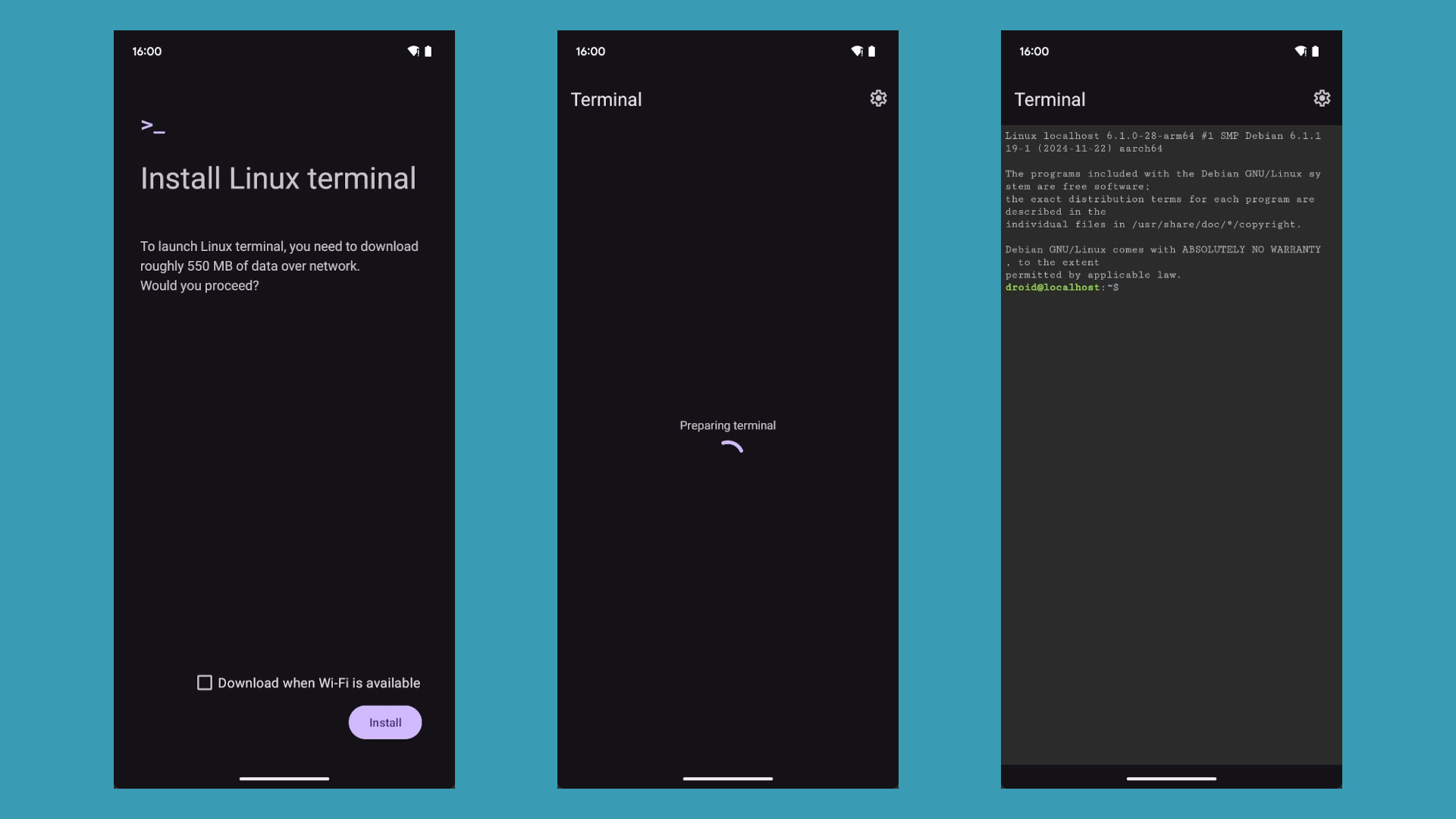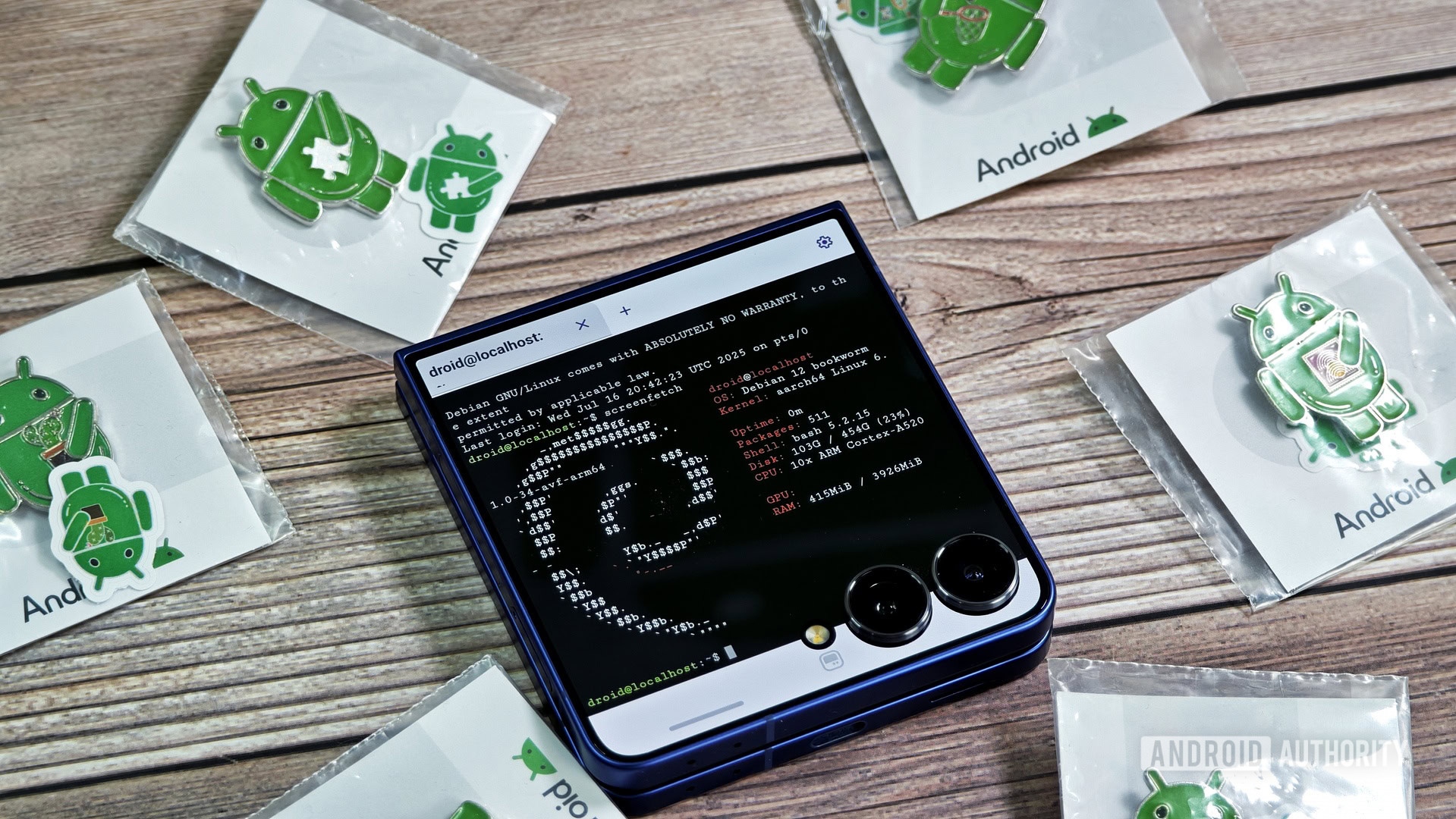Mishaal Rahman / Android Authority
TL;DR
- Samsung’s new Galaxy Z Flip 7 is the first non-Pixel phone to support Google’s Linux Terminal app, but the feature is curiously missing from the Z Fold 7.
- The app requires a non-protected virtual machine, which the Z Flip 7’s Exynos chip supports but the Z Fold 7’s Snapdragon chip currently does not.
- The Terminal app runs a Linux VM and is part of Android 16, but it probably won’t be available on many other devices.
Back in March, Google rolled out a major update to its Pixel devices that added a new Linux Terminal app. This app lets you run full-fledged Linux programs in a virtual machine, a handy feature given that many tools for power users and developers aren’t natively available on Android. While it was initially unclear when the Terminal app would arrive on other Android devices, we’ve discovered that Samsung’s new Galaxy Z Flip 7 is the first non-Pixel phone to support it. Curiously, however, the phone’s larger and more expensive sibling, the Galaxy Z Fold 7, does not.
You’re reading an Authority Insights story. Discover Authority Insights for more exclusive reports, app teardowns, leaks, and in-depth tech coverage you won’t find anywhere else. These reports reflect developments at the time of writing. Some features or details uncovered in leaks may change before official release.
The Terminal app downloads and boots a modified version of Debian, a popular Linux distribution, within a virtual machine. This virtual machine is powered by the Android Virtualization Framework (AVF), the operating system’s subsystem for creating and managing VMs. Although Google introduced AVF in 2022 with Android 13, the Terminal app itself only debuted with the second quarterly release of Android 15. Since OEMs like Samsung typically build their software on major annual OS versions, though, the Terminal app will effectively be an Android 16 feature for their devices.

Mishaal Rahman / Android Authority
However, the inclusion of AVF and the Terminal app in Android’s codebase doesn’t guarantee support on all Android 16 devices. Availability depends on strict technical requirements that are mostly determined by the silicon vendor rather than the OEM. The latest chipsets from both Qualcomm and MediaTek do support AVF, but Samsung chose to disable the feature on its otherwise compatible devices until the recent One UI 8 release, perhaps as it needed to fix incompatibilities with its Knox service.
This hardware dependency explains the curious case of the Terminal app’s availability on Samsung’s latest flagships. Even in One UI 8, the Linux Terminal app is present on the Galaxy Z Flip 7 but missing from the Galaxy S25 series and the Galaxy Z Fold 7. The reason lies in their chipsets: the Z Flip 7 uses Samsung’s own Exynos 2500, whereas the S25 and Z Fold 7 use Qualcomm’s Snapdragon 8 Elite. While both chips support AVF, the Snapdragon 8 Elite only supports the more secure, protected virtual machines. The Terminal app, however, requires a non-protected VM, a capability the Exynos 2500 supports. That’s why the app works on the Z Flip 7 but not its Snapdragon-equipped siblings.
Qualcomm will hopefully address this limitation in a future vendor update. The company’s Snapdragon chipsets are arguably the most powerful chips powering Android devices, but there’s a notable lack of features that take full advantage of that power. Combined with tools like Samsung DeX on the Z Flip 7, the Linux Terminal app can transform a phone into an incredibly capable portable PC. While the app currently lacks graphical app support, we know that feature is on the way, potentially paving the way for running full-fledged Linux PC games on your Android device in the future.







